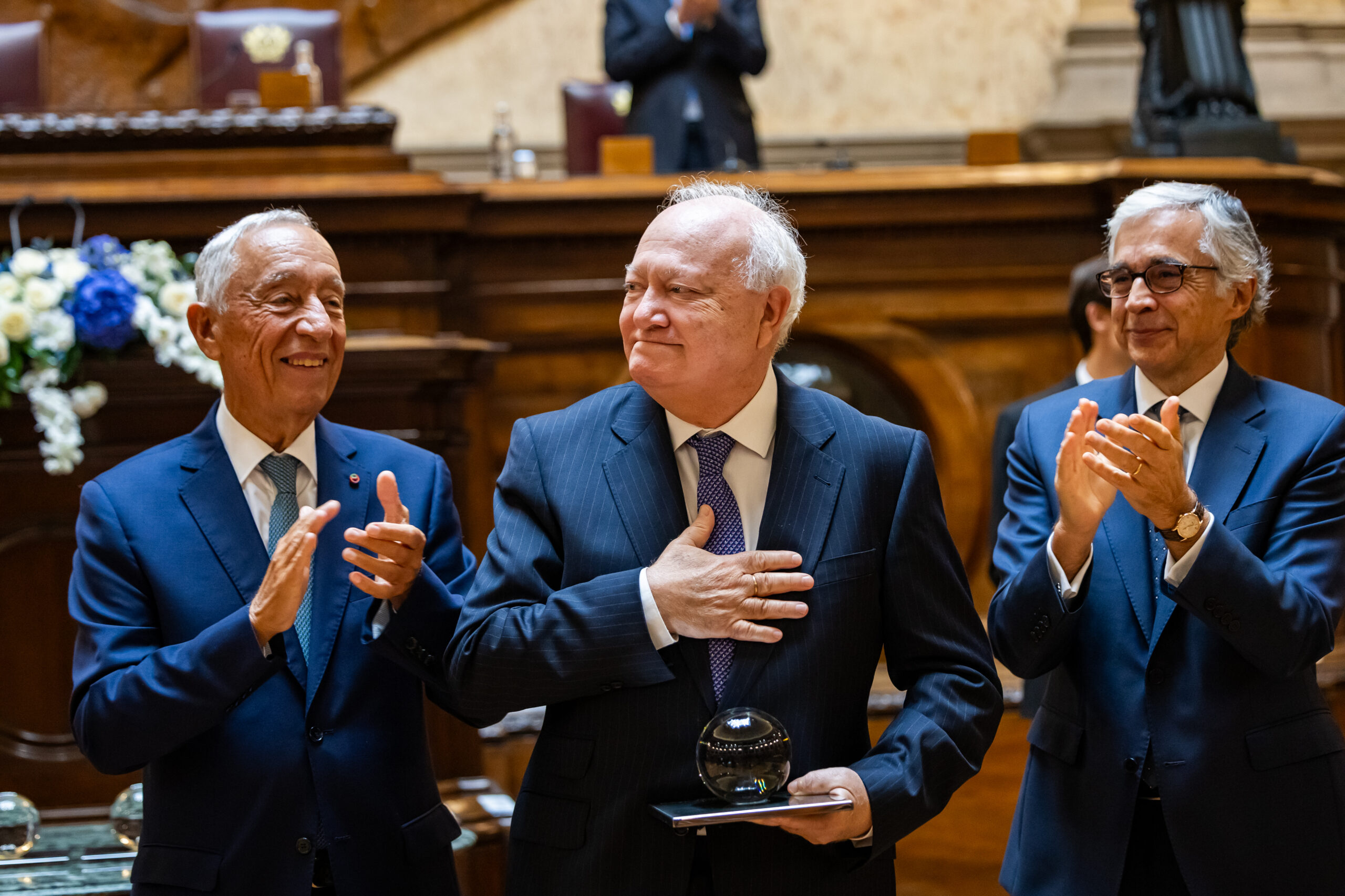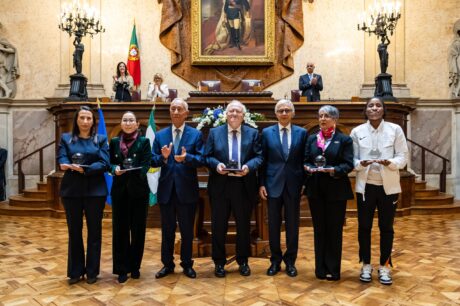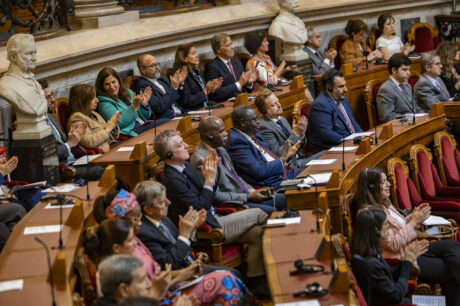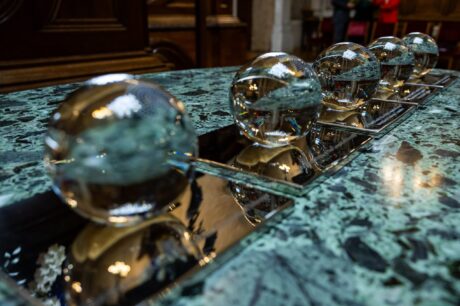Mr. Miguel Ángel Moratinos, Under-Secretary-General and High Representative for UNAOC, was honoured with the North-South Prize of the Council of Europe. The award was presented by H.E. Marcelo Rebelo de Sousa, President of the Portuguese Republic, during a ceremony held in the Senate Chamber of the Portuguese Parliament on 29 October 2025.
Remarks by Under-Secretary-General Miguel Ángel Moratinos,
High Representative for the United Nations Alliance of Civilizations (UNAOC),
at the Award Ceremony of the 30th North-South Prize of the Council of Europe
Lisbon, 29 October 2025

Your Excellency Mr. Marcelo Rebelo de Sousa,
President of the Portuguese Republic;
The Honorable Jose Pedro Aguiar-Branco,
President of the Portuguese Parliament;
Mr. Alain Breset, Secretary-General of the Council of Europe;
Distinguished Members of Parliament,
Excellencies, dear colleagues, friends, ladies and gentlemen,
It is with deep gratitude and humility that I accept the North-South Prize of the Council of Europe. Standing here, in the Parliament of Portugal — a country that has always looked outward to the world with courage, curiosity, and generosity — I am reminded of the Portuguese saying: “O mar não separa, o mar une.”
The sea does not divide — it connects.
That simple truth captures the essence of this award: our shared responsibility to connect, to cooperate, and to reaffirm that what unites us as human beings is far greater than what divides us.
This recognition is not mine alone. It belongs to all those — colleagues, partners, young people, faith leaders, and communities — who have walked beside me in the long journey of building bridges of understanding across cultures and civilizations. I receive it in their name, and in the name of the United Nations Alliance of Civilizations, which I have the honor to lead.
I seize this opportunity to extend my thanks to the esteemed jury for their valuable recognition and the Council of Europe and the North South Center.
Back in 2008, I had the privilege to chair the Council of Europe in my capacity then as the Foreign Minister of Spain. This provided me with a first hand opportunity to understand the dynamics of the Council of Europe.
When I began my career in diplomacy, the world was emerging from the tensions of the Cold War. We believed, perhaps naively, that the end of ideological confrontation would bring an era of peace. Yet, new divisions arose — between North and South, rich and poor, East and West, believers and non-believers. The dream of a fair and peaceful world remained just beyond reach.
The Council of Europe laid the foundations for an extraordinary human adventure—the European Union—built on two main pillars: democracy and human rights. The question then was how to reach that vision, how to achieve those ideals through peace and dialogue.
Despite the challenges, I never lost faith in dialogue.
I didn’t lose faith in virtue of dialogue not because I am an optimist by nature, but because I genuinely believe that dialogue is not an abstract concept. It is a living act — of humility, of courage, of respect.
It means listening even when we disagree.
It means believing that empathy is stronger than enmity.
Time and again throughout my career, I have seen dialogue transform fear into trust, and mistrust into cooperation.
When the Alliance of Civilizations was created twenty years ago, it was a bold initiative: could we turn diversity into a force for peace? could we build an alliance of peace and civilizations instead of walls of confrontation?
Today, amid polarization and rising intolerance, our mission is more vital than ever. The Alliance works to prevent identity-based conflicts by fostering mutual understanding and respect — among youth, faith communities, policymakers, and the media — to ensure that difference becomes an asset, not a threat.
I am particularly moved that this distinguished award is called the North-South Prize.
It carries profound meaning for me.
It reminds us that solidarity is not an act of charity — it is a recognition of our shared destiny.
The challenges we face — from conflict and inequality to climate change and migration — do not stop at borders. The North needs the South as much as the South needs the North. Our future depends on cooperation, not confrontation.
That is why the role of the North-South Center is even more vital today than it was when it was established 35 years ago. The term “Global South” has become central to discussions on the evolving architecture of global governance. In this context, the North-South Center was a pioneer in engaging with the South. Today, it is well positioned to strengthen North-South relations within the framework of an increasingly multipolar world.
Excellencies,
Throughout my career — whether in the Middle East, Europe, or the United Nations — I have witnessed the extraordinary resilience of people who, despite hardship, continue to choose dialogue over despair. From Jerusalem to Beirut, from Sarajevo to Rabat, from Madrid to New York — I have learned that peace is not a treaty; it is a daily practice of empathy and faith in humanity.
Allow me to express a special word of gratitude to Portugal, a nation that has always served as a bridge between continents and cultures — between Europe, Africa, and Latin America.
Last November, Portugal once again demonstrated this spirit when it hosted the 10th Global Forum of the United Nations Alliance of Civilizations in Cascais, under the leadership and gracious presence of President Marcelo Rebelo de Sousa. That forum was a tremendous success — a celebration of diversity, dialogue, and the collective commitment to build #OneHumanity.
Muito obrigado, Portugal, por acreditar no poder do diálogo.
Thank you, Portugal, for believing in the power of dialogue.
I also pay tribute to the Council of Europe and to its North-South Centre for their unwavering commitment to human rights, democracy, and solidarity — principles that must guide us more than ever at a time when trust in institutions and in one another is eroding.
This prize, born of those values, renews my conviction that multilateralism, though imperfect, remains our best hope — if it becomes more inclusive, more human, and more attuned to the voices of the many, not the few.
Let us remember that peace is not built in conferences alone. It begins in classrooms, in homes, in communities — wherever people choose respect over rejection, and compassion over indifference.
It begins when a teacher encourages curiosity instead of prejudice; when a journalist seeks truth instead of division; when a leader acts out of conscience rather than calculation.
Today, as I humbly accept this distinction, I think of the countless individuals — refugees, youth, women, peacebuilders — who work quietly and courageously to heal our fractured world. They are the true builders of the bridge between North and South.
To the Olympic Refuge Foundation, the International Olympic Committee and the International Paralympic Committee, my fellow laureates this year, I offer heartfelt congratulations. Your work reminds us that sport can unite what politics divides — that even in displacement, the human spirit remains undefeated.
Excellencies,
Throughout my life, I have been guided by one simple belief: understanding is stronger than hatred, and compassion is more powerful than fear and respect is more lasting than mere acceptance.
If this prize carries any meaning, it is that the effort to build one humanity — to make of our diversity a source of peace — is not only noble; it is necessary.
I accept this honor with gratitude, humility, and renewed commitment — to continue, with all of you, to make dialogue not merely a word we pronounce, but a way we live.
Muito obrigado.
Photos: © North-South Centre of the Council of Europe / North-South Prize.




